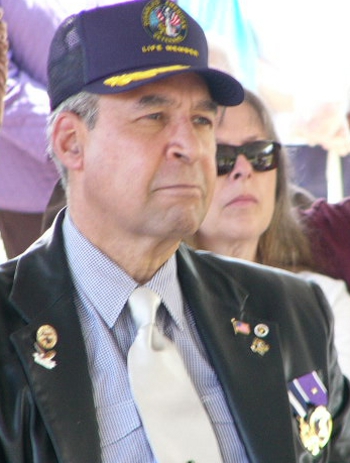 |
| Marine Lance Corporal (Retired) Ricardo C. Binns |
Out of that crucible have come heroes; most unrecognized.
Boundary County is probably one of the few places in the world that appreciates every member who served; Air Force, Army, Navy, Marine, Coast Guard, whether that person served as an infantryman, clerk or cook.
Because he chose to remain quiet, one of the most highly decorated of our local veterans, Ricardo C. Binns, has earned a reputation as a curmudgeon. He finally rode in one of our recent local parades as a guest of honor. Put up with the pain of long-ago wounds to stand with this community as it remembered those who served.
No one noticed when he "went missing."
For most of the summer, Lance Corporal (Retired) Ric Binns' house has been empty. The place on Champs Road in which he lives, pays taxes, raised his horse and built a home.
No one noticed.
As a Navy Cross recipient, as a Recon Marine who lived up to the highest standards of honor in the face of overwhelming odds, as a soldier now under consideration for the nation's highest honor ... a hero by all measure whether the Medal of Honor is to be bestowed or not ... Ric only wants what he was promised by a "grateful nation."
The Veteran's Administation Hospital, he said, has all but killed him. They've given him innoculations for problems he didn't have, they've misdoagnosed and given him pills for what he didn't need and for which he has to break his own ass to get away from.
His last 12-day stay at the VA, he said, was to unhook him from the drugs they'd prescribed. Drugs, he said, that nearly killed him.
He did survive, and he was sent home, still worrying if he'll live to see tomorrow.
Nobody here knew he was gone. Nobody here was on hand to welcome him home when he came back.
"People don't see this, Mike," he said, referring to what he's going through and what he sees other military veterans are suffering as they seek medical care at our nation's Veteran's Administration hospitals. Some get good care, mostly those who've never faced combat. The ones who have, he said, who have a range of issues to deal with, aren't getting the help they need or the quality care they earned.
He's not complaining so much about the doctors, nurses or staff.
The professionals he's met, he said, are great people doing a thankless job in a bureaucracy that won't let them provide the care they know they should ... forced to toe the line or lose a hard-earned job.
He's not surprised by the high incidence of suicide among veterans returning from Iraq or Afghanistan ... the frustration and red tape of dealing with the VA, he said, is often too daunting.
"I don't know if I can tell the story," I said. "It's too big."
"Bullshit." Ric said. "Either you can or you won't."
I'm but a lone, part-time, small-town reporter, wthout the backing of a newsroom, staff, editors or media reach, but Ric's integrity in the years that I've known him, and his insistence that this is a story needing to be told ... that our VA hospitals and supported clinics might be doing a disservice to those men and women who have served this nation so well, especially our own neighbors, compels me to try.
I ask that readers of these pages with experience with the Veteran's Administration share your stories with me ... good, bad or indifferent. Email publisher@newsbf.com. I would also like to know about those events and benefits for veterans taking place around our region that I might assist in publicizing them.
Most of the stories, I'm sure, will be good, as behind every one will be someone, an individual, trying to do the best they can. Someone stymied and frustrated by what they have to go through to do the job they want to do.. Someone stuck in requirements and reporting and all the inane CYA requirements foisted upon them that make no sense by a set of military rules that were outdated the day they were written.
Mr. Binns is grateful to the people of the VA who take his temperature, touch his forehead and give him care.
"The VA has some great people," he said. "They do the best they can."
What might be killing him, he fears, is the process, and the few physicians who give more credence to following a set of rules rather than to provide the care they know they should.